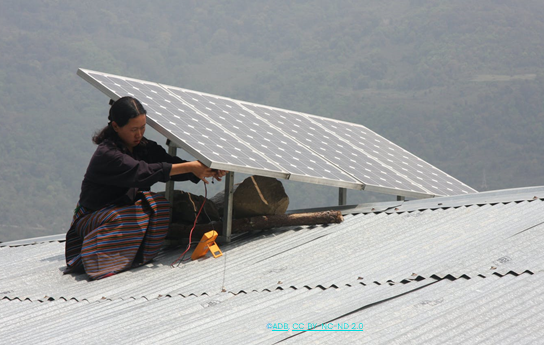
Transition to Renewable Energy: An Opportunity to Advance Gender Equality

If we aim at an effective transition to clean energy, we should first identify the factors enabling and constraining the transition based on a gendered analysis of our context. While setting out our clean energy transition, it is of utmost importance that we bring women on board and benefit from their knowledge, perspectives and their ownership of the transition process. Needless to say, women are key actors in the energy value chain, for example using clean energy at the household level, using energy for small enterprises such as poultry farming, tailoring, branding and packaging of goods or trading of food prepared by solar or clean cooking stoves.
It is with this belief that Prakriti Resources Centre (PRC) and WWF Nepal jointly organised two virtual discussion sessions on Clean Energy Transition as an Opportunity to Advance Gender Equality on 6 and 21 May 2021.
The webinar came at a time when there is a growing realization that women’s role is no longer limited to household energy consumption alone. There is ample evidence of women’s increased engagement in businesses and enterprises, particularly in small businesses and cottage industries. More recently, many women are coming forward to invest in energy and energy-based businesses and enterprises. For example, small businesses and cottage industries are bureaucratically easy to start up, hence, women are attracted to them. Such businesses generate employment and mostly utilize local resources. According to the International Financial Corporation women own about 14,300 small and medium enterprises in Nepal in 2012, accounting for two percent of the country’s GDP in 2012. The Federation of Small and Medium Enterprises Nepal counted that 60% of small and medium enterprises in Nepal are owned by women, indicating that women emerging as increasingly important stakeholders of the energy sector.
Ironically, however, women have no say in decision making in the selection of energy sources, not to talk of their influence in energy-related policy and decisions. The decision-makers in all energy-related agencies such as the Ministry of Energy, Water Resources and Irrigation, Alternative Energy Promotion Centre (AEPC) and other departments are male-dominated. Energy policies and plans are gender-neutral and for that matter do not recognize the roles and potential of women. The exclusion of women in policy and decision-making emanates from the existing social and cultural factors like gender stereotypical roles, social norms and behaviors. Therefore, the transformation of these factors is urgently called for to ensure that energy-related plans, policies and decision-making processes are gender-responsive and women can meaningfully engage themselves in the energy sector and energy-based enterprises.
Against this backdrop, the Multi-Actor Platform for 100% Renewable Energy organized this webinar bringing together the members of the platform, representatives from renewable energy-based women’s enterprises and other stakeholders to discuss the opportunities and challenges in addressing gender issues in the transition to clean energy.
Speaking as lead presenter, Dr. Indira Shakya, Gender and Energy Expert, highlighted the plight of rural women and girls, who are primarily responsible for firewood collection and cooking. This workload, among many other reasons, has forced many girls from dropping out of school and prevented women from engaging in other productive work. Citing clean energy as a solution, she said, improved cooking stoves, biogas, electric stoves and others can become a possible alternative to firewood and make cooking cleaner and safer. She argued that promotion of these cleaner technologies will not only have positive environmental implications but will equally contribute to addressing traditional gender stereotypical roles of women and girls.
Considering gender-responsive approaches in policies and programmes can give a fillip to women’s participation in discourses on energy issues. It can encourage even women from weak economic backgrounds to afford energy services through innovative financing mechanisms and contribute to the national economy. For this to happen, it is essential to
- Promote measures to make upfront costs of connections, electricity subscriptions, and energy-using equipment and appliances affordable, especially for women who may have limited decision-making power in this realm.
- Specifically target on cost-reducing strategies (including subsidies and loans) to women’s circumstances, while making the availability of such subsidies more widely known.
- Address energy service affordability by enabling payment flexibility and reducing payment size, through mechanisms such as pay-as-you-go schemes appropriate to poor women’s needs and circumstances.
- Build an enabling environment that increases women’s ability to afford energy connections: financial inclusion through access to banking and credit, equal legal rights to land and property, greater mobile phone connectivity, and better education and awareness around energy choices.
Later in the webinar, women energy entrepreneurs shared their lived experience, citing the examples of banks and financial institutions hesitating to finance them purportedly because they are women. Therefore, they said, political slogans and speeches that promise promotion of women’s enterprises sound empty and in reality, the business viability of women-led enterprises looks grim. They also spoke of the need to transform gender stereotypes that stand in the way of women having a say in policy and decision-making and effectively engage themselves in the energy sector and energy-based enterprises.
Energy-based enterprises led by women such as women’s energy-intensive food preparation businesses (like drying, processing, packaging, branding) need renewable energy and can be supported with clean cooking energy programmes or through women’s entrepreneurship programmes. This requires specific actions to promote the use of renewable energy in women’s businesses including the provision of information, financing mechanisms, investment in energy infrastructure, and targeted subsidies. The above examples underscore the complementarity between transition to clean energy and advancing gender equality through the provision of specific treatment to women. The policies and plans on energy and gender must recognize and internalize these complementarities. The federal government of Nepal is formulating a Renewable Energy Policy, based on which local governments also have to formulate and implement renewable energy policy tailored to their contexts. This would create the opportunities to embark on a gender-just transition to clean energy.
